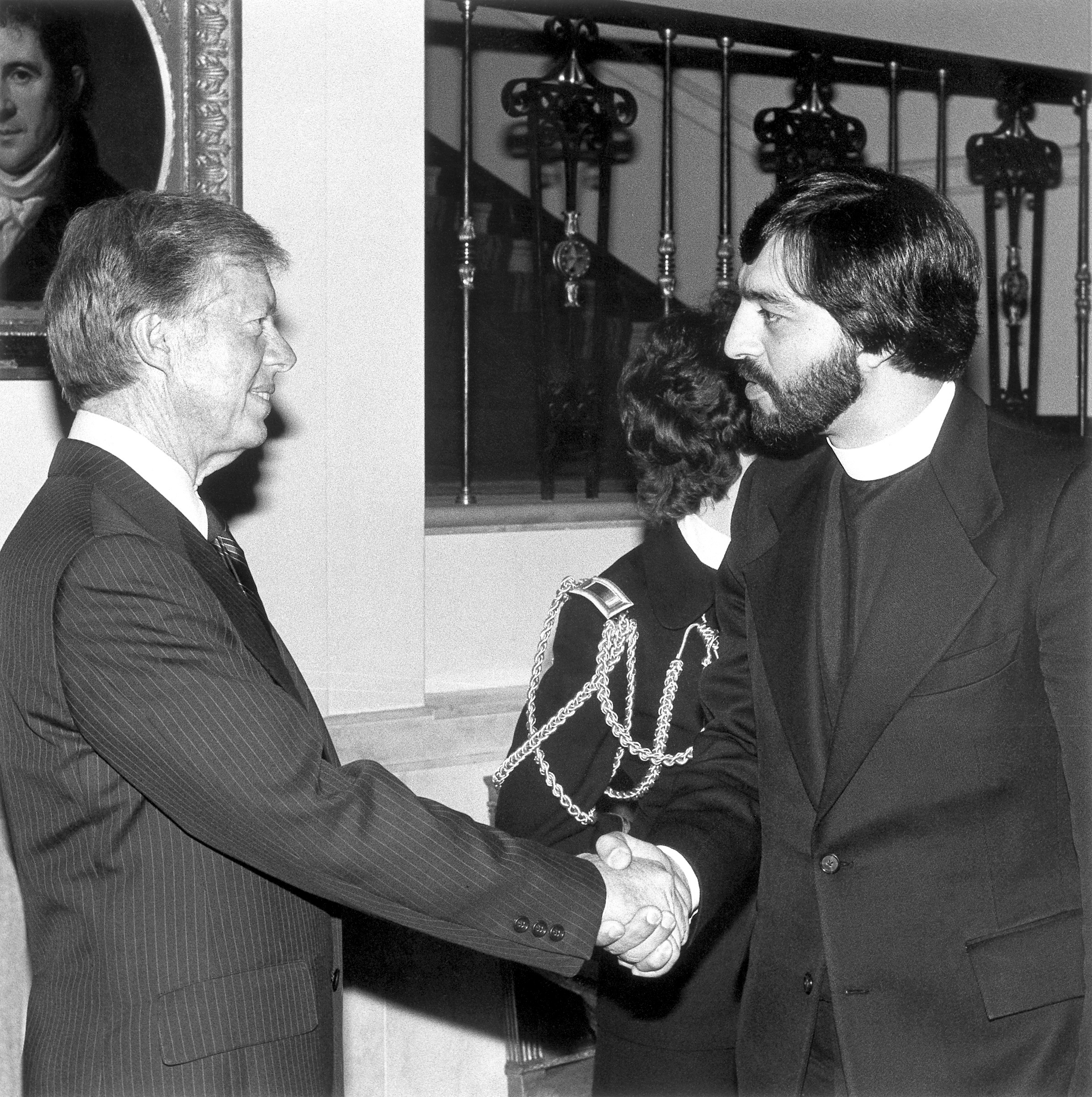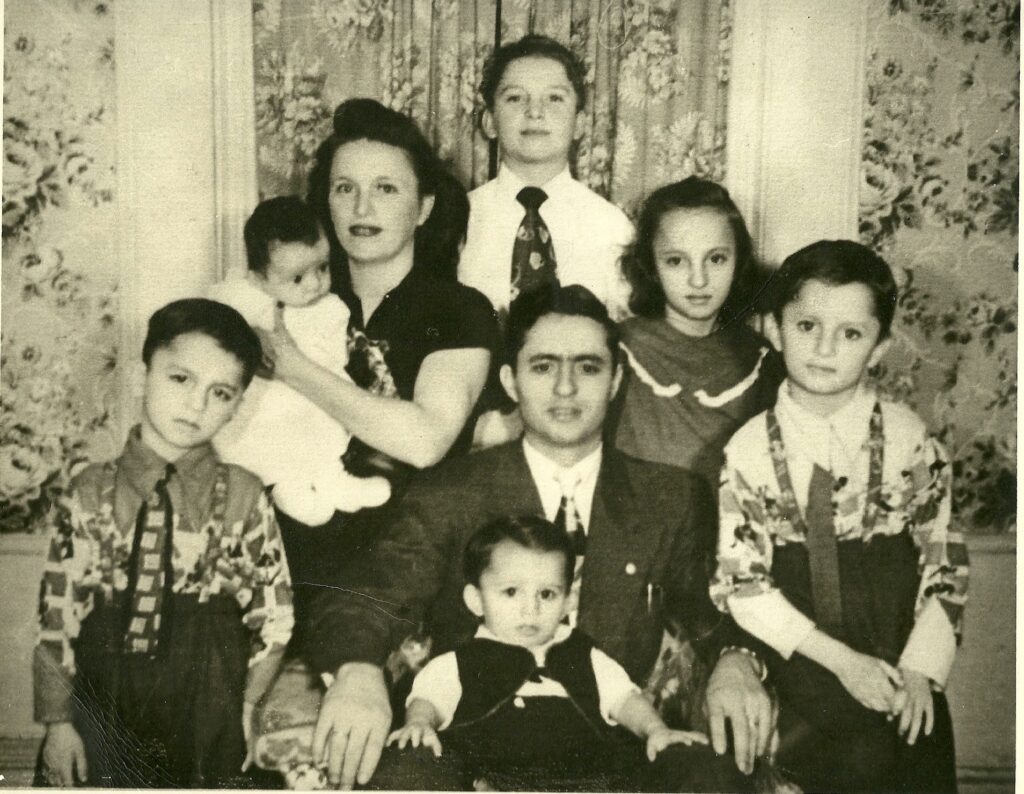
Father Alex Karloutsos may be the most influential Orthodox priest in modern history. He has spent time in every Oval Office going back to Jimmy Carter, culminating in a Presidential Medal of Freedom from Joe Biden. His connections are extraordinary – the presidents, of course, and every patriarch you can imagine, but also a range of twentieth century giants like Henry Kissinger, Elijah Muhammad, Pope John Paul II, and Blackstone founder Pete Peterson, to name four at random. Karloutsos is also incredibly polarizing, with critics viewing him as a nefarious “Grey Eminence” pulling strings behind the scenes of Orthodoxy.
Earlier this year, I conducted a series of interviews with Fr Karloutsos to record his life story. Today, I’m going to recount his origin story – how the son of a widowed Greek Old Calendarist priest gained access to the highest echelons of power in America.
Childhood
Karloutsos was born in Greece, but his story begins in Springfield, Massachusetts, where his father, Michael, was born. Michael’s parents – Fr Alex’s biological grandparents – were Constantinopolitan Greeks who had moved to America. Michael’s mother died in childbirth, and while his father was out of town, the grandmother – Fr Alex’s great-grandmother – traded the infant Michael to another Greek family for $500. Michael’s father tried to get him back, so the adoptive parents left America for Latzio, Greece, where the boy was raised, completely unaware of his American origins.
Michael married a woman named Olga Douros, and they went on to have seven children, six of whom survived to adulthood. Alexander – the future Fr Alex – was born in 1945. A few years later, when Michael learned that he was an American citizen, he decided to move his family to the United States. The family attended a parish that belonged to a non-canonical Old Calendarist sect. Fr Alex remembers, “The Old Calendar church was more flexible in regards to ordination – if you could chant a little bit and read a little bit, there’s a good priest.” So Michael was ordained, and Fr Alex spent a good part of his childhood in the Old Calendarist movement.
When Fr Alex was nine years old, his mother Olga died of tuberculosis. She was thirty-five. The widowed Fr Michael spent the rest of his life as a celibate priest, raising six children as a single father. Not long after Olga’s death, Fr Michael left the Old Calendarists and joined the canonical Greek Archdiocese. “Somebody came to him and said, you should join the New Calendar; it would be a better life for you and your family,” Fr Alex recalled. “So my dad made the switch.” It was a difficult transition. “There was an in crowd and an out crowd, but my dad was always on the outside looking in. And I guess maybe that’s one of the reasons why I’m on the inside looking out. But when I’m inside looking out, I’m always looking in, because I see it through my dad’s eyes. That’s what makes me such a restless priest within the Archdiocese.”
The family moved from Detroit to tiny Bayard, Nebraska, which had a population of 1,519. “It was a nightmare,” Fr Alex says. When the children asked their father how many TV channels Bayard had, Fr Michael said “Ten.” But he was stretching the truth; the town actually had just one channel – Channel 10. “So we went out there, and all we did was watch Channel 10.” Fr Michael was paid $300 a month, “plus all the corn, tomatoes, and bologna we could eat. A lot of bologna.” They were in Bayard for three years. The Karloutsos kids were difficult. “The parish council had enough of us. They wrote a letter to the Archdiocese: we love the priest, but if we could move the kids, we’d be grateful.”
After Bayard the family moved constantly: Charleston, West Virginia; Middletown, Ohio; Concord, New Hampshire; Jamestown, New York. Then Iowa, then New York, next Wilmington, North Carolina; Orlando, Florida; and back to New York.
Boston (1962-69)
In 1962, the future Fr Alex enrolled as an undergraduate at Holy Cross in Boston. Initially, he was still very much the son of an Old Calendarist priest – he was even familiar with the now-infamous Father Panteleimon of Holy Transfiguration Monastery in Boston, which at the time was still part of the Greek Archdiocese, but would soon jump to ROCOR (and, years later, left canonical Orthodoxy in the wake of sexual abuse allegations). But at Holy Cross, for Karloutsos, “all of a sudden, our minds were expanding,” Professors introduced him to existentialism, to “a world outside of Orthodoxy,” as he says, and he was particularly drawn to the work of Carl Jung.
Karloutsos was already beginning to stand out from the crowd. Once, the upperclassmen were engaged in a battle with Archbishop Iakovos over whether to kneel during the Anaphora prayers at liturgy on Sundays. Iakovos favored kneeling, but the students insisted on strictly following the Orthodox tradition that prohibits kneeling on the Lord’s Day. Karloutsos and his undergraduate classmates staged a walkout in support of the upperclassmen. They did another walkout in protest of the Vietnam War.
Karloutsos was his undergraduate class valedictorian, but the school refused to let him give a speech at graduation for fear of what he might say. He then moved up to the seminary graduate program, on track to become a priest. And once again, he became valedictorian. This time, they let him speak – but instead of writing an address, Karloutsos recited a poem:
Much has been written,
much has been said.
Those who have written or spoken
are dying or dead.
Jesus said “Love one another.”
I have nothing significant to add.
And then, dramatically, he walked off the stage. The mighty Archbishop Iakovos jumped up in applause, and the room followed with a standing ovation.
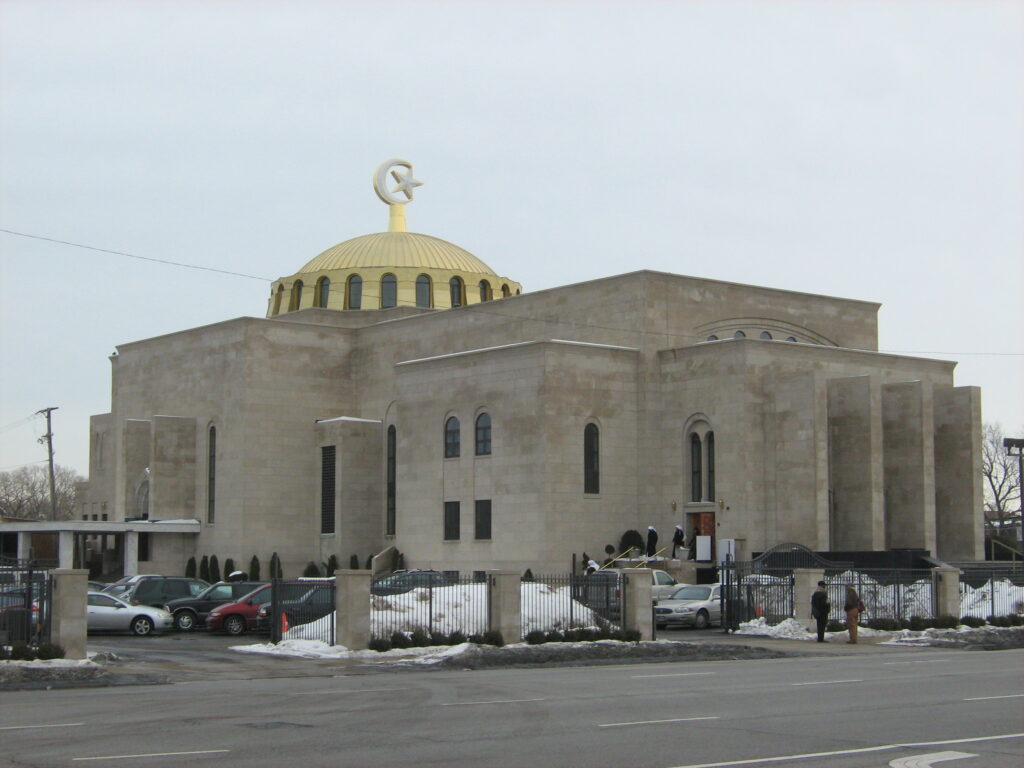
Chicago (1970-74)
After seminary, Karloutsos studied at the Bossey Institute in Switzerland, an ecumenical institute run by the World Council of Churches. By this point he had gotten married to Xanthi Karavellas, and when he returned to the United States he was ordained a priest and assigned to Saints Constantine and Helen in Chicago as the assistant to Fr Byron Papanikolaou (father of Dr Aristotle Papanikolaou of Fordham University). Fr Karloutsos has fond memories of Fr Byron, whom he calls “a priest’s priest.” Whereas Karloutsos’s own father taught him what not to do – the mistakes to avoid – Karloutsos saw Fr Byron as a model of what kind of priest he wanted to be.
The Saints Constantine and Helen church building was the largest in all of American Orthodoxy, but the parish faced a difficult situation. The neighborhood, once full of Greeks, was now dominated by Chicago’s black community. Teenagers would break the windows of the church gymnasium, and Fr Karloutsos would chase them down the street. The church was struggling financially, unable even to afford to replace the broken windows. It was clear that the status quo wasn’t sustainable, and so they sold the building for $4 million in cash to the Nation of Islam, led by Elijah Muhammad, with funding from Libyan dictator Muammar Gaddafi. (The parish relocated to Palos Hills, where many of its parishioners had moved.)
In Chicago, Fr Karloutsos quickly became known as an outstanding youth director. He was young – mid-twenties – and played basketball and pool with his parish youth. “I could actually not only shoot baskets, but I could shoot my mouth off pretty well.” Soon he was appointed to be the diocesan youth director. He organized a youth camp and youth rallies. It was clear that he was destined for something bigger. As his apprenticeship under Fr Papanikolaou neared its end, he was due to be given his own parish – but Papanikolaou wrote to Archbishop Iakovos saying, essentially, “This young priest has certain gifts that I’ve never seen before. One of them is opening doors. I don’t want him ever to leave my parish, but if he has to leave, it would be a big mistake if you did not take him into the Archdiocese.”
And so Iakovos called Fr Karloutsos to New York, where he put him in charge of youth ministry throughout the Greek Orthodox Archdiocese of North and South America.
New York and Washington (beginning in 1974)
“I didn’t know Archbishop Iakovos well,” Karloutsos told me. “I got to know him, and we became very, very close. Archbishop Iakovos was my ideal archbishop and priest, in many ways. He was an extraordinary, gifted man, and as Mayor Ed Koch would say, when Iakovos went into the room, even if he was in the corner, he was the center of the room. His presence was amazing.” For a few years, he was even Iakovos’s driver.
At this point, the relationship between the U.S. government and Ecumenical Patriarchate (and its American archdiocese) was at a low ebb. In the early Cold War era, the U.S. and EP were pretty tight – the United States played an important role in putting Archbishop Athenagoras on the throne in Istanbul, and Athenagoras saw himself as America’s agent in the Orthodox world. All that changed as the 1950s wore on – when anti-Greek riots devastated the Greek community in Istanbul in 1955, the United States did nothing. The emerging crisis over Cyprus led to the mass deportation of tens of thousands of Greeks from Turkey in the 1960s. In his later years, Athenagoras tried to appeal to the Nixon Administration to secure EP succession, but the White House had no interest. After Athenagoras died in 1972, his worst fears were realized: the Turkish government vetoed several candidates for Patriarch (including Archbishop Iakovos), and when (Greek-American) Vice President Spiro Agnew tried to prevent this, Secretary of State Henry Kissinger declared, “I don’t give a damn about the Turkish bishops. I give a damn about the Turkish government.”
In July of 1974, Turkey invaded Cyprus, occupying the northern part of the island – an occupation that continues to this day. The Greek-American community was outraged, and some of the community’s leaders began to organize themselves. The modern-day Greek-American lobby really has its origins here, in 1974. Fr Karloutsos took charge of organizing the youth of the Archdiocese to lobby the U.S. government, and he was working side-by-side with other key Greek-American political figures.
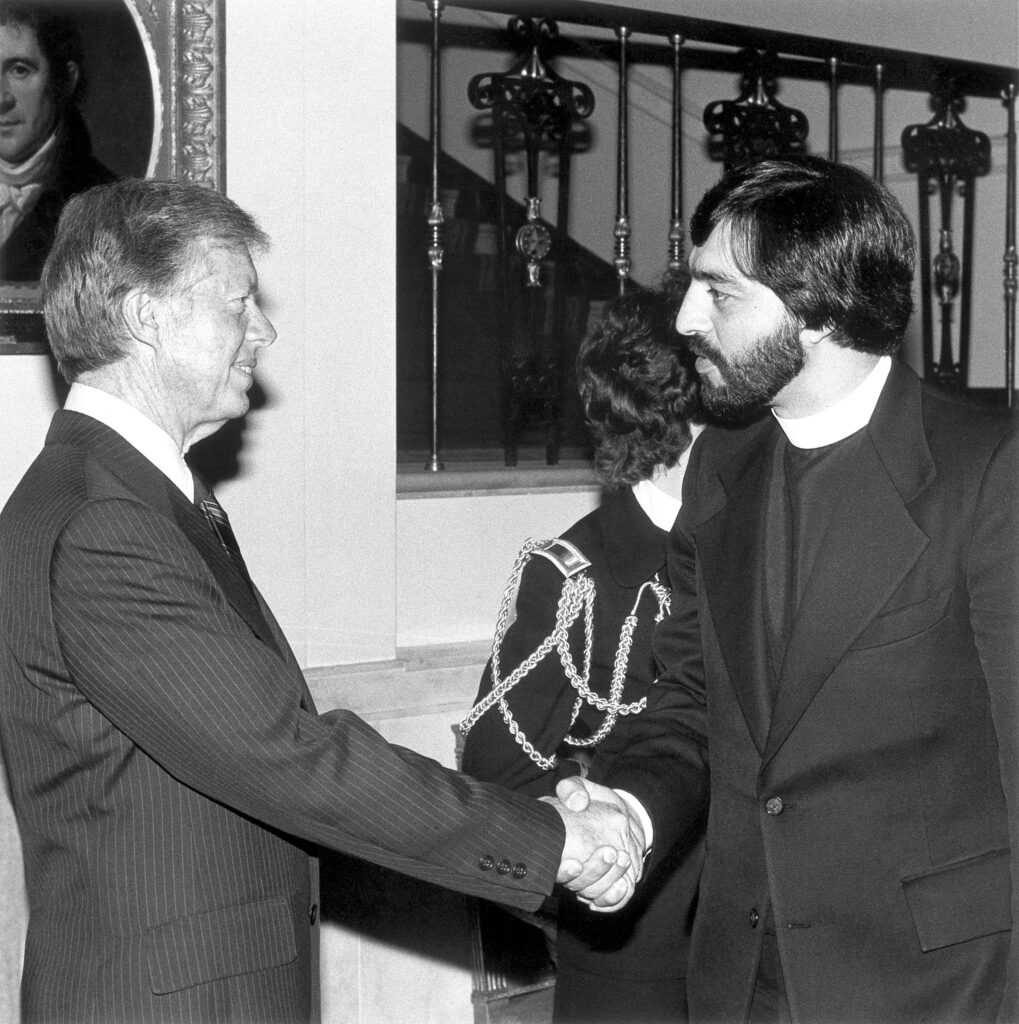
Another big moment happened in January 1977, when Jimmy Carter became President of the United States. Archbishop Iakovos felt snubbed when he wasn’t invited to offer a prayer at the inauguration. In response, over the summer, he created a new archdiocesan department – the Department of Church and Society – and he made Fr Karloutsos the director. “Many people love you,” Iakovos told Karloutsos, “but I’m going to give you a position now that they’ll not only love you, they’ll fear you and respect you.” Karloutsos responded that he didn’t want to be feared. “Well,” said Iakovos, “they’ll respect you. And once they do that, they’ll also talk about you. But if you don’t want anybody to talk about you don’t say anything worthwhile, don’t do anything worthwhile, don’t be anything worthwhile.”
Fr Karloutsos’s first assignment in his new position was to establish a relationship between the Archdiocese and the White House. But how would a complete outsider gain access and influence at the center of global power?
It began with a big gathering of religious leaders at the White House – a pretty ordinary thing, with hundreds of religious leaders crowded together in the East Room to hear some talks and, if they were lucky, shake hands with the President. Fr Karloutsos felt like he was a fish out of water. “I’m scared to death and saying, ‘What am I doing here?’ I don’t know anything. I went to Holy Cross seminary. I mean, I’m not Harvard, I’m not Columbia. And these guys are all smart. They all know what they’re doing.”
But Fr Karloutsos’s outsider status turned out to be an advantage. “As everybody was trying to get the President’s attention, I went in and spoke to the secretary. I went in and I talked with the gardener. I talked to all the people on the periphery, not at the heart of everything, and I treated them with love and respect. So in my mind, I said, these are all the people around the President, which means that they’ll have time to speak to the President about everybody that was there. It’s human nature, you know?” He attended more of these events, met more people on the periphery of the Oval Office. “And they’d say, when I walked in, ‘Father Alex, how are you doing?’ The gardener, the secretaries. So finally, the time comes when I’m meeting Jimmy Carter and he says, ‘So you’re Father Alex! I’ve heard so much about you.’”
Fr Karloutsos’s department had no real budget and no archdiocesan credit card, but his job involved expenses. To cultivate his political connections, he needed to travel, to take people out to dinner. And so he learned how to fundraise on the fly, getting wealthy Greek-Americans to back his efforts. He became close to two Greek-American congressmen, Representative (later Senator) Paul Sarbanes and House Majority Whip John Brademas (later president of New York University). He was building his network.
In 1979, Archbishop Iakovos celebrated his twentieth anniversary as Greek archbishop. He wanted something big to celebrate, so he called in Fr Karloutsos, who’d never organized an event like that before. Years before, during his honeymoon in Pyrgos, Greece, Karloutsos happened to meet a Greek-American restaurateur from Kearney, Nebraska, named George Peterson. The restauranteur’s son, Pete, had gone on to become Nixon’s Secretary of Commerce – the first Greek-American to serve in a presidential cabinet – but although he was Greek, “he was a Brahmin of our community; he had nothing to do with the Greeks, not involved in the Church at all. In fact, everybody thought he was Swedish.” By 1979, Peterson was chairman of the Lehman Brothers financial firm. Later, he created the investment giant Blackstone and chaired the Council on Foreign Relations for twenty-two years.
Fr Karloutsos decided to try to get Pete Peterson to be the chairman of Iakovos’s year-long anniversary celebration. His one big advantage was the Nebraska connection – Karloutos, like Peterson, had spent a big part of his childhood in small-town Nebraska. He wrote to Peterson, mentioning their shared Nebraska origins, his chance meeting with Peterson’s restauranteur dad, the pitch to be the chair of the Iakovos anniversary celebrations. “His secretary, Melba Duncan, called me up out of the blue one day and said, ‘Father Alex, Mr. Peterson is going to call you in five minutes. If you answer his five questions correctly, he’ll do it. If you don’t answer him, he’s not going to do it. So be ready.’ I said to myself, what the heck am I going to say to this guy? So he called me in five minutes. I answered his questions, and he agreed to serve as chairman.”
As the 1980 presidential election approached, Fr Karloutsos and his allies decided to try to get President Carter to award Archbishop Iakovos the Presidential Medal of Freedom. The rationale was based on Iakovos’s support of Martin Luther King Jr. and his participation in King’s march at Selma. Nowadays, this has achieved a kind of mythical status among Greek-Americans, and images of Iakovos and King circulate every year around MLK Day. But back then, Iakovos was actually subjected to a lot of criticism within the Greek-American community for his actions. It was here, with Karloutsos and friends in 1980, that the legend of Iakovos and King really came into being.
The congressmen, Sarbanes and Brademas, weren’t too keen on the idea of Carter giving Iakovos the medal, because they were bitter at Carter for his friendly relations with Turkey – they felt that Carter had sold out the Greek community by lifting a U.S. arms embargo on Turkey in the wake of the Turkish invasion of Cyprus. But Fr Karloutsos argued the other side. “At the end of the day, if the President decides to give him the Presidential Medal of Freedom, they’ll only know that he was the Presidential Medal of Freedom recipient. They won’t remember that he got it under Carter.” Karloutsos’s argument won the day, and Iakovos got his medal.
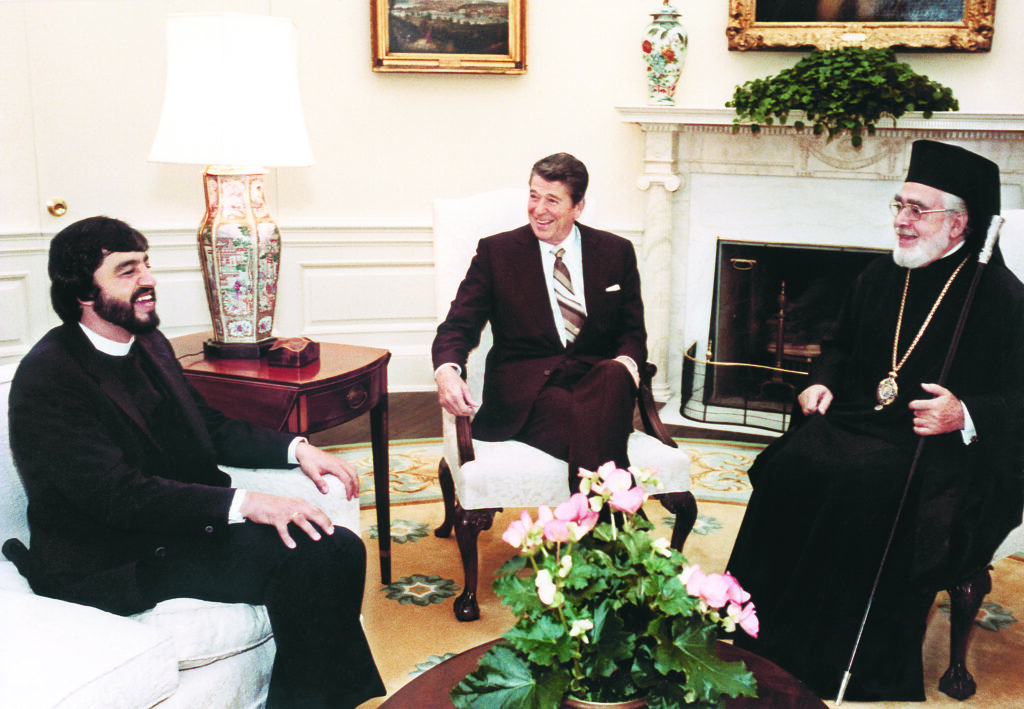
Of course, Carter lost the 1980 election to Ronald Reagan – a man to whom Fr Karloutsos had no connections at all. “I’m watching TV and I’m going, what do we do now? Now we have a relationship with Carter. Nobody knows Reagan.” Karloutsos happened to notice that, when Reagan visited the Senate, he was accompanied by a Greek-American lobbyist, Tom Korologos (who passed away on July 26 of this year). Fr Karloutsos cold-called Korologos, who helped connect him with the Public Liaison Office of the Reagan White House. First, Karloutsos went to the Religious Affairs people, but the man he spoke with assumed that Greek Orthodox people weren’t Christians. So he tried Ethnic Affairs, where he developed a relationship with Reagan advisor Jack Burgess. It was thanks to Burgess and Korologos that Fr Karloutsos got access to key players in the Republican Party, including Reagan’s vice president, George H.W. Bush.
Here is how Fr Karloutsos remembers his first meeting with Reagan, not long after Reagan survived an assassination attempt. “Ronald Reagan walked into his office, and I remember Tom Korologos saying, ‘Mister President, this is Father Karloutsos.’ And Reagan said, ‘Father Karloutsos? I was looking forward to meeting Father Alex.’ I said, ‘Well, Mister President, I am Father Alex.’ He says, ‘You know, I’m a Dodgers fan, and we beat you in the World Series, because I know you’re a Yankee fan.’”
At this point – 1982 – Fr Karloutsos was thirty-seven years old. And while he was not a politician, bureaucrat, lobbyist, or donor, he had, indeed, gained access to the highest echelons of power in America.
